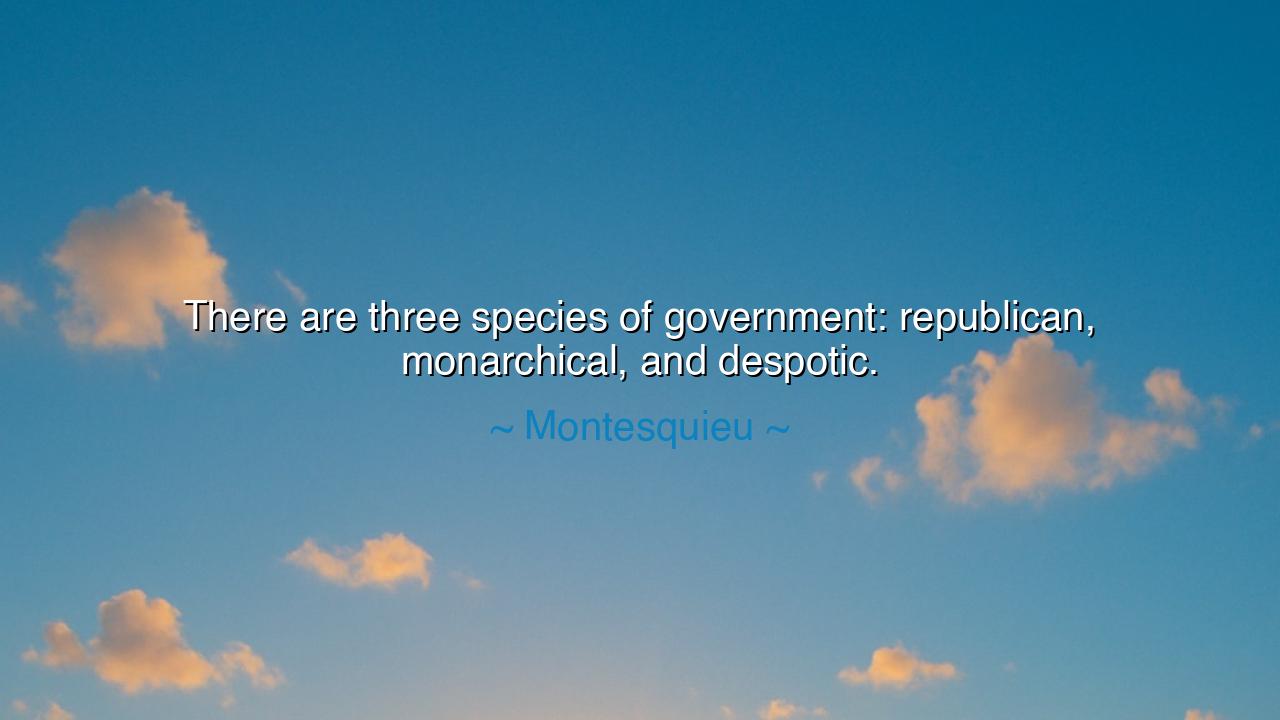
There are three species of government: republican, monarchical






In the wisdom of the Enlightenment, when reason sought to pierce the darkness of tyranny and superstition, Montesquieu — philosopher, jurist, and prophet of liberty — uttered a truth that still echoes through the ages: “There are three species of government: republican, monarchical, and despotic.” With these words, he did not merely divide the world of rulers; he revealed the soul of power itself. He spoke not as a mere observer of politics, but as a physician diagnosing the ailments of nations. His vision was one of moral architecture — a map of how men organize authority, and how that authority, in turn, shapes the spirit of its people.
The origin of this teaching lies in Montesquieu’s masterpiece, The Spirit of the Laws (1748), a work that laid the foundations of modern political philosophy. In it, he examined the laws, customs, and governments of many lands, from ancient Rome to the kingdoms of Europe, seeking the principles that governed them all. He found that the world’s systems of rule could be traced to three great types: the republican, where power rests in the people or their representatives; the monarchical, where one ruler governs according to fixed laws and traditions; and the despotic, where all power lies in the hands of one man who rules by his will alone. Each system, Montesquieu said, has its own spirit — its own animating force that gives it life or death.
The republic, he taught, is born of virtue — not the virtue of saints, but the civic virtue of citizens who love their country more than themselves. In a republic, the people are both the rulers and the ruled; their freedom depends on their morality, their self-restraint, and their respect for law. When this virtue dies, when citizens become selfish, corrupt, or indifferent, the republic decays into faction and chaos. Montesquieu looked to ancient Rome, where the early republic thrived on duty and sacrifice, but later fell when greed and ambition consumed the Senate and people alike. Thus, he warned, liberty cannot survive without virtue; and virtue cannot survive without vigilance.
The monarchy, by contrast, is governed by honor — a principle that binds both king and subject to a code of conduct. The monarch’s power is balanced by tradition, law, and the expectations of nobility. A just monarch rules not through fear, but through the respect of his people and the counsel of the wise. Montesquieu admired monarchies that preserved order and stability, yet he cautioned that honor can decay into vanity and privilege if unchecked by justice. In the France of his own time, he saw the beauty and danger of monarchy — a system capable of greatness when guided by wisdom, but destined for ruin when corrupted by excess.
And lastly, there is the despotic government — the darkest form of rule, sustained not by virtue or honor, but by fear. In such a system, the will of one man becomes law, and the people, reduced to obedience, lose their dignity and hope. Montesquieu observed this in the empires of the East, where tyranny crushed freedom beneath the weight of divine authority and absolute power. Yet he knew that despotism is not confined to any one land or culture; it can arise wherever citizens surrender their courage, wherever leaders forget restraint, wherever the fear of authority replaces the love of justice. For the spirit of despotism dwells in the hearts of those who prefer comfort to freedom.
History gives us endless mirrors for Montesquieu’s wisdom. Consider the fall of the French monarchy itself. When Louis XIV declared, “I am the state,” he transformed monarchy into despotism. His successors, detached from the people’s suffering, lost the honor that had once justified their rule. When the Revolution came, the monarchy crumbled, the republic was born — and in time, even the republic fell into the hands of Napoleon, who crowned himself emperor. Thus, in a single nation, all three species of government arose in succession, each born from the death of the one before. Montesquieu’s vision was proven not in theory, but in the blood and ashes of history.
Yet his words are not merely the study of kings; they are a guide for all generations. For the republican, the lesson is clear: liberty requires virtue — the courage to serve one’s country, to act with integrity, to protect freedom even when it is inconvenient. For the monarch, the lesson is honor — to rule not by vanity or cruelty, but by justice and the welfare of the people. And for every citizen, the warning against despotism must be heard: guard against fear, for when fear rules the mind, tyranny rules the world.
So, my child of the republic, remember the wisdom of Montesquieu: every form of government carries within it both light and shadow. The spirit of liberty lives only when virtue, honor, and justice walk together. If the people grow corrupt, the republic falls; if rulers grow proud, the monarchy decays; and if all grow afraid, despotism triumphs. Therefore, live as one who serves truth above power, and freedom above comfort. For the form of your government may change with time — but the spirit you uphold will determine whether your nation rises in light, or falls into darkness.






AAdministratorAdministrator
Welcome, honored guests. Please leave a comment, we will respond soon